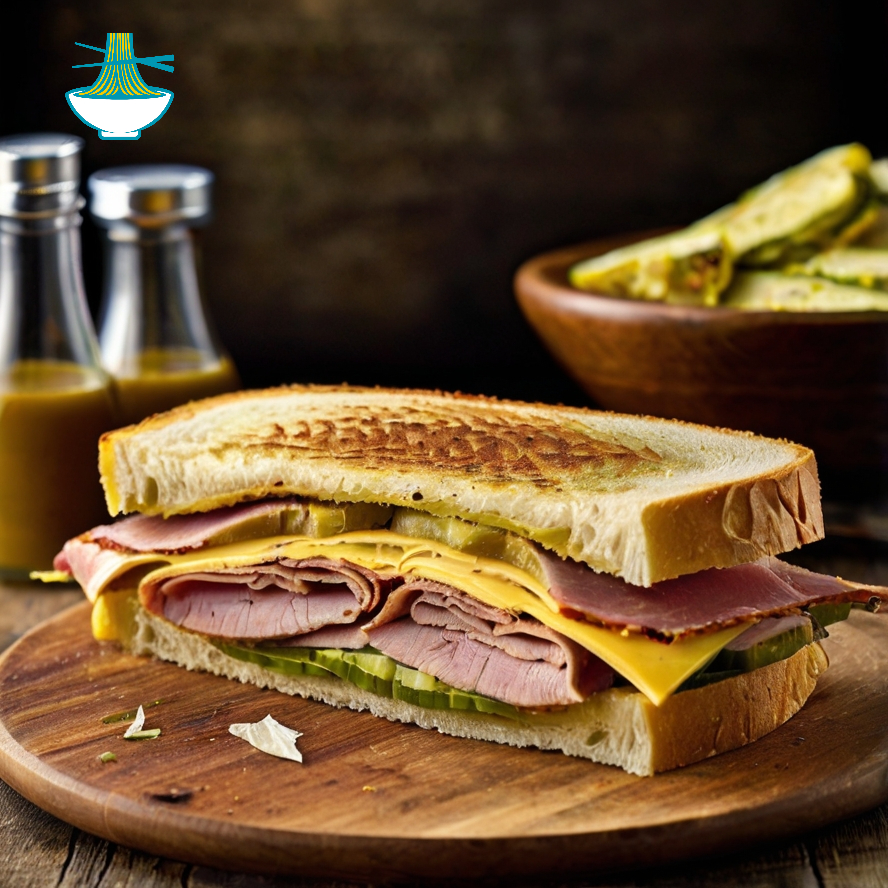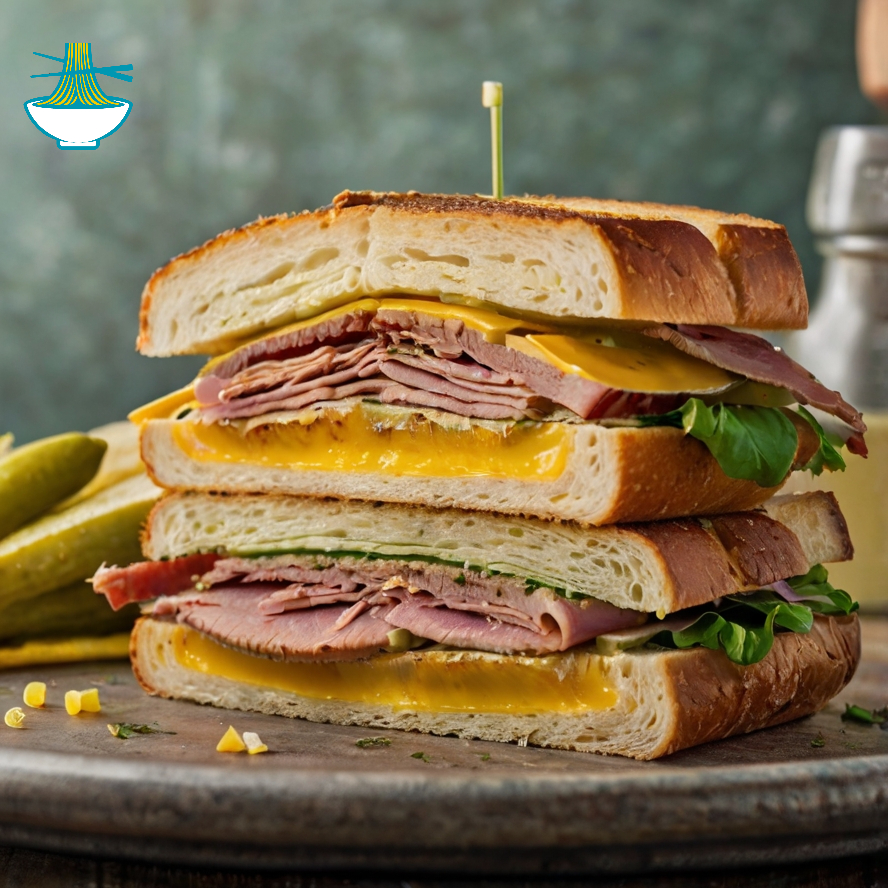The Cuban sandwich, or Cubano, is a classic Cuban-American sandwich featuring a flavorful combination of roasted pork, ham, Swiss cheese, pickles, and mustard, all layered between slices of Cuban bread. Sometimes, salami is included for extra flavor. This sandwich is pressed to achieve a crispy exterior and melted cheese interior, making it a delicious and satisfying meal.

Originating in Cuba, the Cuban sandwich reflects the island's diverse culinary influences, including Spanish, African, and Caribbean flavors. It became popular in Cuban-American communities, particularly in Florida, where it has become a staple in Cuban cuisine. The sandwich's name, "Cubano," highlights its Cuban roots and its role in Cuban-American culture.
Ingredients:
- Cuban bread (or French bread as a substitute)
- Roasted pork
- Ham
- Swiss cheese
- Pickles
- Mustard
- Salami (optional)
- Butter or margarine
Instructions:
1. Preheat your sandwich press or griddle to medium-high heat.
2. Slice the Cuban bread in half lengthwise and spread butter or margarine on both sides.
3. Spread mustard on the bottom half of the bread.
4. Layer roasted pork, ham, Swiss cheese, pickles, and salami (if using) on the mustard-coated bread.
5. Top with the other half of the bread.
6. Cook the sandwich on the press or griddle for 5-7 minutes per side, until the bread is crispy and the cheese has melted.
7. Allow the sandwich to cool slightly before slicing and serving.
Notes:
- Traditional Cuban bread is preferred for its unique flavor and texture, but French bread can be used if necessary.
- Roasted pork can be homemade or sourced from a Cuban deli.
- Adjust ingredient quantities to suit personal tastes.
- Variations include adding mayonnaise, lettuce, or tomato.

Nutrition Value:
1. Cuban bread (or French bread as a substitute)
- Calories: Approximately 150 calories per 1-ounce serving of Cuban bread
- Carbohydrates: About 30 grams per 1-ounce serving
- Protein: Roughly 4 grams per 1-ounce serving
- Fat: Around 1 gram per 1-ounce serving
- Sodium: About 250 milligrams per 1-ounce serving
- Cholesterol: 0 milligrams per 1-ounce serving
- Vitamins: Provides some B vitamins (e.g., niacin, thiamine)
- Minerals: Contains small amounts of iron and calcium
- Nutritional benefit: Cuban bread provides a good source of energy from carbohydrates and some essential B vitamins, though it is relatively low in fat and protein.
2. Roasted pork
- Calories: Approximately 250 calories per 3-ounce serving
- Carbohydrates: About 0 grams per 3-ounce serving
- Protein: Roughly 22 grams per 3-ounce serving
- Fat: Around 18 grams per 3-ounce serving
- Sodium: About 70 milligrams per 3-ounce serving
- Cholesterol: Approximately 80 milligrams per 3-ounce serving
- Vitamins: Good source of B vitamins, particularly B12 and niacin
- Minerals: Rich in iron, zinc, and selenium
- Nutritional benefit: Roasted pork provides a high amount of protein and essential nutrients like iron and B vitamins, which are crucial for energy metabolism and red blood cell formation.
3. Ham
- Calories: Approximately 120 calories per 2-ounce serving
- Carbohydrates: About 1 gram per 2-ounce serving
- Protein: Roughly 12 grams per 2-ounce serving
- Fat: Around 7 grams per 2-ounce serving
- Sodium: About 800 milligrams per 2-ounce serving
- Cholesterol: Approximately 30 milligrams per 2-ounce serving
- Vitamins: Contains some B vitamins, especially B6 and B12
- Minerals: Provides iron and zinc
- Nutritional benefit: Ham is a good source of protein and provides several essential vitamins and minerals, though it is relatively high in sodium and fat.
4. Swiss cheese
- Calories: Approximately 100 calories per 1-ounce serving
- Carbohydrates: About 1 gram per 1-ounce serving
- Protein: Roughly 8 grams per 1-ounce serving
- Fat: Around 8 grams per 1-ounce serving
- Sodium: About 50 milligrams per 1-ounce serving
- Cholesterol: Approximately 30 milligrams per 1-ounce serving
- Vitamins: Rich in calcium and provides some vitamin A
- Minerals: Good source of calcium and phosphorus
- Nutritional benefit: Swiss cheese is a valuable source of protein and calcium, supporting bone health and providing essential nutrients.
5. Pickles
- Calories: Approximately 5 calories per 1-ounce serving
- Carbohydrates: About 1 gram per 1-ounce serving
- Protein: 0 grams per 1-ounce serving
- Fat: 0 grams per 1-ounce serving
- Sodium: About 300 milligrams per 1-ounce serving
- Cholesterol: 0 milligrams per 1-ounce serving
- Vitamins: Contains small amounts of vitamin K
- Minerals: Provides some potassium
- Nutritional benefit: Pickles add flavor with minimal calories and provide vitamin K, though they are high in sodium.
6. Mustard
- Calories: Approximately 10 calories per 1-tablespoon serving
- Carbohydrates: About 1 gram per 1-tablespoon serving
- Protein: 0 grams per 1-tablespoon serving
- Fat: 0 grams per 1-tablespoon serving
- Sodium: About 55 milligrams per 1-tablespoon serving
- Cholesterol: 0 milligrams per 1-tablespoon serving
- Vitamins: Contains small amounts of vitamin A and C
- Minerals: Provides some calcium and magnesium
- Nutritional benefit: Mustard adds flavor with very few calories and can provide trace amounts of vitamins and minerals.
7. Salami (optional)
- Calories: Approximately 120 calories per 1-ounce serving
- Carbohydrates: About 1 gram per 1-ounce serving
- Protein: Roughly 5 grams per 1-ounce serving
- Fat: Around 10 grams per 1-ounce serving
- Sodium: About 500 milligrams per 1-ounce serving
- Cholesterol: Approximately 35 milligrams per 1-ounce serving
- Vitamins: Contains some B vitamins, including B12
- Minerals: Provides iron and zinc
- Nutritional benefit: Salami offers additional protein and flavor but is high in fat and sodium. It's best used in moderation.
8. Butter or margarine
- Calories: Approximately 100 calories per 1-tablespoon serving
- Carbohydrates: About 0 grams per 1-tablespoon serving
- Protein: 0 grams per 1-tablespoon serving
- Fat: Around 11 grams per 1-tablespoon serving
- Sodium: About 90 milligrams per 1-tablespoon serving
- Cholesterol: Approximately 30 milligrams per 1-tablespoon serving (for butter)
- Vitamins: Butter provides vitamin A; margarine may be fortified with vitamins A and D
- Minerals: Provides some calcium in fortified margarine
- Nutritional benefit: Butter and margarine add richness and flavor but are high in fat. Margarine is often used as a substitute for butter to reduce saturated fat intake.


Comments